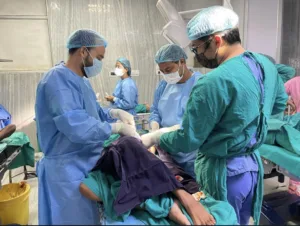Introduction
A common medical problem that affects millions of people worldwide is inguinal hernia. It happens when a weak area or rip in the lower abdominal wall allows soft tissues, usually a portion of the intestine, to protrude through. Although inguinal hernias are frequently treated surgically, there are other choices. The different aspects of inguinal hernia, surgical and non-surgical treatment options, and the value of prevention will all be covered in this article.
Understanding Inguinal Hernia
Understanding a medical condition’s nature is the first step in treating it. The inguinal canal, which is in the groin region, is where an inguinal hernia is frequently discovered. Due to the spermatic cord’s presence and other physical characteristics, it is more common in men. Inguinal hernias, however, can also occur in females.
Causes of Inguinal Hernia
Inguinal hernias can arise as a result of numerous reasons. Increased pressure in the abdomen area is one of the main causes. Heavy lifting, persistent coughing, obesity, or straining during bowel movements can all cause this pressure. Inguinal hernias can also be predisposed to by inherent deficiencies in the abdominal wall.

Symptoms and Diagnosis
It is essential to recognize the signs of an inguinal hernia in order to act quickly. A visible protrusion in the groin area, pain or discomfort while exercising, and a feeling of pressure or heaviness are typical symptoms. Consult a healthcare practitioner for a full checkup if you experience these symptoms.
Common Symptoms
- Visible bulge in the groin
- Discomfort or pain during physical activity
- Sensation of pressure or heaviness
Physical Examination
Doctors can often diagnose an inguinal hernia through a physical examination of the affected area. They may ask you to cough or strain to observe the hernia’s protrusion.
Imaging Tests
In some cases, the doctor may order imaging tests like ultrasound or MRI to confirm the diagnosis and assess the hernia’s size and location.
Conservative Treatment Options
Not all inguinal hernias require immediate surgery. In some cases, doctors may recommend conservative approaches to manage the condition effectively.
Watchful Waiting
For small, asymptomatic hernias, doctors may adopt a “watchful waiting” approach, closely monitoring the hernia’s progression and symptoms.
Lifestyle Changes
Certain lifestyle modifications, such as avoiding heavy lifting and straining, can alleviate symptoms and prevent further hernia development.
Use of Trusses or Support Belts
Trusses or support belts can be worn to help keep the hernia in place and reduce discomfort.
Surgical Intervention for Inguinal Hernia
While conservative treatments work for some patients, surgery remains the most effective and long-lasting solution for inguinal hernias. There are various surgical approaches to repair the hernia.
Herniorrhaphy
Herniorrhaphy is the traditional open surgery technique in which the surgeon makes an incision at the hernia site, pushes the hernia back into the abdomen, and strengthens the abdominal wall with sutures.

Laparoscopic Repair
Laparoscopic hernia repair involves making several small incisions and using a laparoscope (a thin, lighted tube with a camera) to guide the surgical instruments for hernia repair.
Open Mesh Repair
In open mesh repair, the surgeon reinforces the weakened abdominal wall by placing a synthetic mesh over the hernia, promoting tissue growth and preventing future herniation.
Preparing for Hernia Surgery
Before undergoing surgery, patients must be adequately prepared. This preparation includes discussing any underlying health conditions, medications, and allergies with the surgeon.
Postoperative Care and Recovery
Recovery from hernia surgery requires following the surgeon’s instructions diligently. This may involve resting, avoiding strenuous activities, and keeping the incision site clean and dry.
Potential Complications of Surgery
Although inguinal hernia surgery is generally safe, there are potential risks, including infection, bleeding, and recurrence.
Alternatives to Surgery
While surgery is the primary treatment option, some cases may be managed without surgical intervention.
Preventing Inguinal Hernia
Prevention plays a vital role in reducing the risk of inguinal hernias.
Exercises and Physical Therapy
Certain exercises and physical therapy routines can strengthen the abdominal muscles and reduce the risk of hernia formation.
Dietary Changes
Maintaining a healthy diet and managing body weight can contribute to preventing inguinal hernias.
Living with an Inguinal Hernia: Coping Strategies
For individuals who cannot undergo surgery immediately or choose not to, adopting coping strategies can help manage symptoms and improve quality of life.
Conclusion
Although they are frequent, inguinal hernias don’t always have to be painful. A person’s life can be profoundly impacted and the effects of an inguinal hernia can be lessened by prompt diagnosis, suitable treatment, and preventative measures.
FAQs
- Can an inguinal hernia go away on its own? Inguinal hernias do not resolve on their own and usually require medical intervention.
- Is laparoscopic surgery better than open surgery for hernia repair? Laparoscopic surgery offers certain advantages, such as smaller incisions and potentially quicker recovery times, but the choice of surgical approach depends on individual circumstances.
- Can I exercise with an inguinal hernia? It’s essential to consult with a healthcare professional before starting any exercise regimen with an inguinal hernia.
- Are there any long-term complications of living with an untreated inguinal hernia? An untreated inguinal hernia can lead to severe complications like incarceration or strangulation, which require emergency surgery.
- Is inguinal hernia surgery covered by insurance? In most cases, hernia surgery is covered by health insurance, but it’s essential to check with your specific insurance provider for details.
